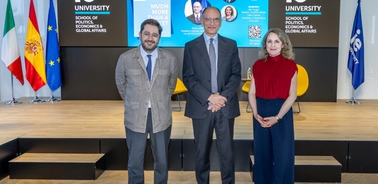Enrico Letta on geoeconomics and the future of the EU Single Market

On May 10, 2024, IE University had the pleasure of hosting Enrico Letta, President of the Jacques Delors Institute and Former Prime Minister of Italy. Mr. Letta presented his new report, “Much More than a Market,” which offers a deep dive into the challenges facing the European Union and its most influential tool—the EU Single Market.
In his conversation with Dr. Ilke Toygür, Director of IE University’s Global Policy Center, Mr. Letta mentioned the need to enhance security and commit to a fair, green and digital transition. He emphasized that the time was ripe to rethink the European Single Market using tools tailor-made to navigate the strikingly different new global order of the 21st century.
According to Mr. Letta, the Single Market is an ongoing project that needs to be reformed to keep up with the challenges of the evolving European and global contexts, as well as the nature of the economy itself. His conceptual framework considers elements such as the fifth freedom—a mechanism to enhance innovation, education and research—with higher learning institutions like IE University playing a central role.
Ilke Toygür: In the report, you state that the rules-based international order faces serious challenges and that the world is re-entering a phase of power politics. Weaponizing trade relations is an essential part of this great power competition. The Single Market has always been the source of European power. How should the EU rethink the Single Market as the center of its geoeconomics?
Enrico Letta: The Single Market is indeed the cornerstone of Europe’s economic strength. To rethink it as the center of geoeconomics, the EU must integrate economic security and strategic autonomy into its framework. This means not only fostering internal cohesion and market efficiency, but also ensuring resilience against external shocks and dependencies. By aligning the Single Market with geoeconomic strategies, such as enhancing supply chain security and reducing dependencies on non-EU countries, the EU can leverage its economic power more effectively. This involves a coordinated approach to trade policies, investment in critical technologies and a robust framework for protecting key industries.
I really like the concept of the fifth freedom. The Single Market was established on January 1, 1993, more than 30 years ago, with four freedoms: goods, services, capital and people. These freedoms were designed for an economy in the 20th century. Now, you must introduce a fifth freedom: to enhance research, innovation and education. I think this is extremely important since Europe’s capacity to innovate, adapt and create new job opportunities for its citizens, without leaving anyone behind, defines its competitiveness.
What would be the initial steps to support this fifth freedom? What could universities—like this one—do?
The first steps to implement the fifth freedom would involve increasing investment in research and development, fostering cross-border collaborations, and creating a more integrated education system across the EU. Universities can play a crucial role by developing joint programs, facilitating student and faculty exchanges and partnering with industries to drive innovation. Additionally, enhancing digital infrastructure and ensuring that educational resources are accessible to all regions will be vital. Universities can lead by example, promoting interdisciplinary research and creating platforms for collaboration with other EU institutions.
IT: There are many challenges ahead for Europe when it comes to the new institutional cycle of 2024–2029. You mention three challenges that face the next legislation, which I agree with: commitment to a fair green and digital transition, how to pursue enlargement and the need to enhance security. The problem is how to finance all this, which you already state will be a heated debate. If you were still a member of the European Council, what would your starting point be? What are the common priorities for nearly all 27 EU member states?
EL: If I were still a member of the European Council, my starting point would be to establish a clear prioritization framework that balances immediate needs with long-term goals. The three common priorities should be:
- Financing the green and digital transition, establishing a European green and digital fund that pools resources from public and private sectors to finance sustainable projects and technological advancements.
- Enhancing security, developing a cohesive EU security policy that includes both traditional defense and cyber security, supported by a dedicated budget.
- Facilitating enlargement, creating a structured pathway for candidate countries that includes access to the Single Market under specific conditions to ensure stability and adherence to EU values.
To finance these priorities, the EU must explore innovative funding mechanisms such as green bonds, digital taxation and reallocating existing funds to high-impact areas.
IT: Enlargement: I cannot end this conversation without asking you about it. Do you think giving Single Market access to candidate countries once they fulfill certain conditions—though it raises the question of what conditions those would be—is a good idea? If so, why?
EL: Yes, providing Single Market access to candidate countries under specific conditions is a good idea. It allows these countries to integrate economically with the EU, fostering stability and growth while they work towards full membership. This conditional access can help ensure candidate countries adhere to the necessary economic and political standards, promoting reforms and alignment with EU policies. It also provides a tangible incentive for these countries to continue their progress, ensuring the enlargement process is both rigorous and beneficial for all parties involved.
Get more expert insights on the EU Single Market and the future of the EU on our Publications page.